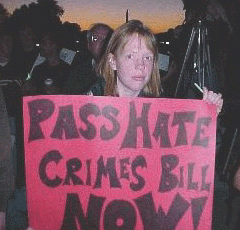 |

 |
|
1999 Starts the Busiest Year Yet on Record |
| Compiled by The National Gay & Lesbian Task Force
 Washington, D.C. –January 28--The National Gay and
Lesbian Task Force released its first summary of state legislative
activity for the 1999 session, calling it the busiest start ever to
the legislative year with respect to gay-related and HIV/AIDS-related
bills.
Washington, D.C. –January 28--The National Gay and
Lesbian Task Force released its first summary of state legislative
activity for the 1999 session, calling it the busiest start ever to
the legislative year with respect to gay-related and HIV/AIDS-related
bills.
In 26 states 111 such measure have been introduced. At this time last year, only 24 bills were being considered in fifteen states. Like in the previous three years, the right wing has taken aim at gay, lesbian, bisexual, and transgender couples. At the same time, there is greater momentum for hate crimes legislation than in years past. "As the visibility of our families, relationships, and children increase, so do attacks against us. These measures are concerted and dangerous, and only a vital activist movement can stop them," said Kerry Lobel, National Gay and Lesbian Task Force executive director.
In addition to battling hostile bills throughout the country, activists in twelve states are working to pass hate crimes bills. The highly publicized killing of Matthew Shepard in Wyoming has spurred greater support for hate crimes legislation. Wyoming is one of the states considering such a measure Details about these measures and those related to civil rights, schools, sodomy, transgender, domestic partnership, campus, health, and HIV/AIDS issues can be found in the Task Force's "Legislative Update," which will be released monthly. They will be available online at www.ngltf.org/legupdate99/legup99.html. At the end of the year the Task Force will release "Capital Gains and Losses," a complete report on state legislative activity for 1999. Previous year's reports are available at www.ngltf.org. National Gay and Lesbian Task Force State Legislative Update - January 28, 1999 This year has been one of the busiest openings of state legislative sessions for the gay, lesbian, bisexual, and transgender (GLBT) community. Already the National Gay and Lesbian Task Force (NGLTF) has tracked 111 bills, 45 favorable and 66 unfavorable, affecting GLBT equality in the areas of hate crimes, civil rights, marriage, families, domestic partnership, schools, sodomy law repeal, health, HIV/AIDS, and transgender issues. A chart with a numerical breakdown of introduced legislation can be found at www.ngltf.org/legupdate99/legup012899.pdf. Hate Crimes Favorable
 Thirteen hate crimes bills have been introduced in twelve states.
In seven states bills have been introduced to add sexual orientation
to existing hate crimes statutes (CO, MS, NY, VA, OK, ID, MT). The
New York Assembly recently passed its bill; it is now under
consideration in the Senate, where the bill has stalled during
previous attempts at passage.
Thirteen hate crimes bills have been introduced in twelve states.
In seven states bills have been introduced to add sexual orientation
to existing hate crimes statutes (CO, MS, NY, VA, OK, ID, MT). The
New York Assembly recently passed its bill; it is now under
consideration in the Senate, where the bill has stalled during
previous attempts at passage.
In Texas, a measure has been proposed to strengthen the state's existing statute by enumerating groups that would be covered under the law. The law as it is written is currently too vague to be enforced effectively. Bills in Indiana and South Carolina would establish first-time hate crimes laws in those states. California's legislature is again considering a bill to equalize penalties for anti-gay hate crimes with penalties for hate crimes committed against other groups. Other states likely to see hate crimes legislation this year include Michigan and Hawaii. One of the most dramatic fights shaping up over passage of a hate crimes bill is in Wyoming, where last October's brutal murder of Matthew Shepard has galvanized groups to pass the state¹s first ever hate crimes law. To date at least four different bills have been introduced. The strongest of these measures would create enhanced penalties for hate crimes committed because of a person's race, religion, color, disability, sexual orientation, national origin or ancestry. The House recently passed its version of the bill. The Senate is awaiting final House action before moving forward. Other Wyoming bills introduced vaguely define hate crimes as acts committed against a person because of membership in a "group". Modeled after Texas' largely unenforceable hate crimes law, these bills have drawn criticism from the Bias Crimes Coalition for their weak language. The largest obstacle in moving forward now lies with the issue of bill language. Governor Jim Geringer has refused to support any bill that includes mention of specific victim groups. Advocates insist on passing a bill that is both constitutional and enforceable. For more information, contact Sid Smith with the Wyoming Grassroots Project at ssquid@hotmail.com. Unfavorable One Montana senator, having decided that there are too many laws in that state, has vowed to repeal many of the state¹s existing laws. The first on his list is the hate crimes law, which currently excludes sexual orientation. Wyoming¹s three other hate crimes bills that have been proposed (see above description) are too vague to be enforced. Civil Rights Favorable Measures promoting GLBT equality at work and within communities have been introduced in four states (CA, DE, NY, WV). California Assembly Speaker Antonio Villaraigosa has re-introduced a bill to add sexual orientation to the Fair Employment and Housing Act, which would strengthen the state's employment and housing non-discrimination policies. Activists in Delaware have reintroduced a bill prohibiting discrimination in employment on the basis of sexual orientation. New York's bill would prohibit discrimination on the basis of sexual orientation in the areas of employment, housing, education, public accommodations, and credit. Organizers in West Virginia have introduced two bills that collectively would ban discrimination on the basis of sexual orientation in the areas of housing and employment. Maryland Governor Parris Glendening has also publicly vowed to push for inclusion of sexual orientation in the state¹s civil rights law if a bill is introduced. Unfavorable Bills seeking to deny equal rights to GLBT people have been proposed in four states (MS, NE, OR, SC). An employment non-discrimination measure in the Nebraska legislature would prohibit employment discrimination on the basis of sexual orientation. However, a homophobic provision known as the "Boys Town clause" exempts employers who "engage in or are responsible for the care and education of children less than eighteen years of age in a residential facility." Last December, in Tanner v. OHSU, an Oregon appeals court ruled that the state constitution mandates that all government employees be eligible to receive domestic partnership benefits. The ruling also determined that Oregon's constitution prohibits private and public employment discrimination on the basis of sexual orientation. Right-wing groups are now challenging this ruling by attempting to pressure the state legislature to pass a series of anti-GLBT referenda to appear on the November ballot. One such measure pertaining to GLBT civil rights, HJR 6, would require majority approval through referendum of any state or local measures banning discrimination based on sexual orientation. Another Oregon bill would establish a zero tolerance policy for discrimination in public employment against various groups but excludes sexual orientation and gender status. Mississippi and South Carolina also have legislation that would strengthen those states' civil rights policies but that exclude sexual orientation. Marriage Unfavorable
 Attacks on same-sex marriage already have been launched in nine
states (NJ, MA, MO, MS, NE, NY, OR, TX, WV). A Mississippi bill
would place an initiative on the November ballot where voters would
choose whether to amend their state Constitution to ban same-sex
marriage. Currently, state law already prohibits such marriages.
An Oregon bill is also a referendum for a same-sex marriage ban
that the legislature could place on an upcoming ballot.
Attacks on same-sex marriage already have been launched in nine
states (NJ, MA, MO, MS, NE, NY, OR, TX, WV). A Mississippi bill
would place an initiative on the November ballot where voters would
choose whether to amend their state Constitution to ban same-sex
marriage. Currently, state law already prohibits such marriages.
An Oregon bill is also a referendum for a same-sex marriage ban
that the legislature could place on an upcoming ballot.
In Hawaii, the legal battle continues over the right to marry, with a case still pending before the Hawaii Supreme Court. Following the passage last fall of a constitutional amendment empowering the legislature to ban same-sex marriage, marriage rights advocates claim that the legislature must enact a new law prohibiting same-sex marriage before such unions can be banned. And, in a first act of defiance against a California anti-same-sex marriage initiative slated for the March 2000 ballot, approximately 78 United Methodist pastors engaged in a union blessing of a lesbian couple in Sacramento, California on January 16. Currently 30 states ban same-sex marriage. On February 12, National Freedom to Marry Day, communities throughout the country will be organizing actions advocating for the freedom to marry. To find out more, contact National Freedom To Marry Day Coordinator Christopher Calhoun at (323) 860-7352 or visit www.lambdalegal.org. Families Favorable In New Hampshire, a bill has been introduced that would repeal the current ban against GLBT people adopting children or becoming foster parents. Unfavorable The right to adopt or provide foster care is under attack in six states (AR, IN, OK, TX, UT, VA). In Arkansas and Utah, those states' respective foster care oversight boards approved regulations banning GLBT people from becoming foster parents, while in three states (IN, OK, TX), legislation has been introduced to ban GLBT people qualifying to adopt or to become foster parents. A Virginia measure would nullify paternal consent to an adoption requirement if the father has been convicted of sex crimes; it is unclear from the bill's current wording whether those convicted of consensual sodomy would fall under the provisions of the bill. For more general information on anti-GLBT adoption measures contact Shannon Minter with the National Center for Lesbian Rights at (415) 392-6257 or Michael Adams with the ACLU Lesbian and Gay Civil Rights Project at (212) 549-2627. Several non-inclusive domestic violence measures have been introduced in two states. An Arizona bill would amend the existing definition of a domestic violence victim to limit its applicability to those in opposite-sex relationships. A domestic violence bill in Oregon would create the crime of domestic violence, although it is unclear from current bill language if victims in same-sex relationships would be covered under its provisions. Domestic Partnership Favorable Measures to secure domestic partnership benefits have been introduced in three states (CA, CO, MS). In California, several bills then-Governor Pete Wilson vetoed during last year's session now face prospects of becoming law with initial pledges of support from Governor Gray Davis. These proposals include bills to: create a statewide domestic partnership registry and add domestic partners to existing conservatorship and hospital visitation laws; provide health insurance and other benefits for domestic partners of public employees; and mandate insurers to offer domestic partner benefits equal to those offered spouses. In Colorado, there is a measure to grant inheritance rights to committed partners of deceased persons. In Hawaii, Governor Ben Cayetano plans to introduce a bill that would grant many of the same rights and privileges to domestic partners as those extended to married couples. And in Mississippi, a bill has been proposed to allow two or more persons not related to occupy a dwelling as a home; the broad language has the potential to include GLBT couples. Unfavorable Bills to ban or restrict domestic partnership benefits are being considered in three states (AZ, OR, SC). An Arizona measure would prohibit the state or any county, city, town, or other political subdivision of the state from providing health and accident coverage for domestic partners of its employees. In South Carolina a bill would establish bereavement leave for state employees who are members of a deceased person's immediate family; same-sex couples or domestic partners are not included in the definition of immediate family. In Oregon, attempts are underway to invalidate the recent decision in Tanner v. OHSU, which mandates that all Oregon state employment be eligible for domestic partnership benefits. Right wing groups proposed HJR 5, a referendum requiring voters to approve a ballot measure granting benefits to non-married partners of state employees. Schools Favorable Measures to ensure safe schools for GLBT students are or will be under consideration in four states (CA, NY, TX, WA). The Texas and California bills would prohibit public educational institutions from discriminating against students on the basis of sexual orientation. The New York bill would create a written sexual harassment policy for public schools for incidences based on the student's sexual orientation. A Washington measure will soon be introduced which requires public schools to create malicious harassment policies regarding GLBT students. Measures addressing instruction on AIDS prevention in public schools have been introduced in Massachusetts and New Jersey. Unfavorable GLBT students are under attack in three states (AZ, MO, NJ). The Arizona bill, which has been stalled, would require school districts to deny funding, use of space, and use of employees to student organizations that "promote a sexual orientation," while in Missouri, a bill exists which establishes guidelines for sexual education in public schools without including criteria for sexuality education. A proposal in New Jersey would require teaching pre-marital abstinence in public school sexual education and AIDS education courses. Sodomy
 Texas is currently the only state with two bills introduced that
would or could effectively repeal the state sodomy law. A gay Texas
couple arrested and charged under the sodomy law last fall are
continuing their constitutional court challenge. Arkansas, Louisiana,
Mississippi, and Virginia also face legal challenges to their sodomy
laws.
Texas is currently the only state with two bills introduced that
would or could effectively repeal the state sodomy law. A gay Texas
couple arrested and charged under the sodomy law last fall are
continuing their constitutional court challenge. Arkansas, Louisiana,
Mississippi, and Virginia also face legal challenges to their sodomy
laws.
On January 19, a Baltimore Circuit Court judge ruled that the anal sex provisions of the Maryland sodomy law were unconstitutional. This follows an earlier October ruling that the same-sex oral sex provisions of the law were constitutional. Health Favorable Measures supporting GLBT persons¹ health needs have been introduced in five states (MS, MT, ND, NV, VA). A Mississippi bill would require medical practitioners to keep confidential their reports of rape or other sex crimes to protect victims' privacy. Montana and North Dakota have bills introduced that would prohibit state, private firms, and individual persons from divulging "individually identifiable health care information". Virginia is considering a bill that would prohibit HMOs from discriminating against patients based on various characteristics; sexual orientation is included in the bill. HIV/AIDS Favorable Eight measures have been introduced supporting people with HIV/AIDS. Several of the more significant bills include an Arkansas measure legalizing the use of medical marijuana; several proposals to create needle exchange projects in New Jersey, Massachusetts, and Arkansas; and a California bill to create a system using unique identifier codes to better track HIV/AIDS cases. Unfavorable Thirty measures hostile to people with HIV/AIDS have been introduced. The major bills include measures to criminalize transmission or possible transmission of HIV in four states (MA, MS, NY,VA); bills to mandate testing of alleged criminals or convicts (MA, MO, NJ, NY, SC, VA); measures to mandate pre-marital testing for HIV (AZ, MA, MS, NJ, TX); and bills to mandate testing of pregnant women in (NJ, SC). Transgender Unfavorable Oregon currently faces a bill that would exclude sex change operations from coverage under the Oregon Health Plan. |

© 1997-99 BEI